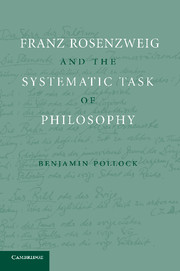Book contents
- Frontmatter
- Contents
- Acknowledgments
- Introduction: The Star of Redemption as “System of Philosophy”
- 1 System as Task of Philosophy: “The Oldest System-Program of German Idealism”
- 2 “A Twofold Relation to the Absolute”: The Genesis of Rosenzweig's Concept of System
- 3 Alls or Nothings: The Starting-Point of Rosenzweig's System
- 4 “The Genuine Notion of Revelation”: Relations, Reversals, and the Human Being in the Middle of the System
- 5 Seeing Stars: The Vision of the All and the Completion of the System
- Conclusion: The All and the Everyday
- Bibliography
- Index
1 - System as Task of Philosophy: “The Oldest System-Program of German Idealism”
Published online by Cambridge University Press: 28 July 2009
- Frontmatter
- Contents
- Acknowledgments
- Introduction: The Star of Redemption as “System of Philosophy”
- 1 System as Task of Philosophy: “The Oldest System-Program of German Idealism”
- 2 “A Twofold Relation to the Absolute”: The Genesis of Rosenzweig's Concept of System
- 3 Alls or Nothings: The Starting-Point of Rosenzweig's System
- 4 “The Genuine Notion of Revelation”: Relations, Reversals, and the Human Being in the Middle of the System
- 5 Seeing Stars: The Vision of the All and the Completion of the System
- Conclusion: The All and the Everyday
- Bibliography
- Index
Summary
In march 1913, the leo liepmannssohn auction house offered up for sale a two-page manuscript, a “slightly discolored” but “very interesting treatise about ‘An Ethics,’” hand-written by none other than “Hegel (G. W. Fr.), the great philosopher (1770–1831).” The Prussian State Library in Berlin purchased the manuscript, and Franz Rosenzweig found it at the library the following year while conducting research for his book Hegel und der Staat. Rosenzweig read this apparent fragment of a Hegelian essay with great excitement, but something about the text troubled him, too. After comparing the text first to the myriad Hegelian manuscripts amid which he was immersed at the time, and then to other groundbreaking writings of early German Idealism, Rosenzweig arrived at two bold conclusions regarding the character and the authorship of the short text, conclusions which had dramatic consequences both for the fate of the short text itself, and for the way in which the development of German Idealism came to be understood in its light.
Rosenzweig's first conclusion was that while the manuscript was unquestionably written in Hegel's hand, most likely in the early summer months of 1796, neither the ideas presented in the text nor its cavalier style seemed to fit what was known about the melancholic, intellectually uncertain Hegel of the mid-1790s. “Only one person in the philosophical Germany of 1796 possessed this youthful-victorious tone” that pervades the text-fragment, Rosenzweig determined, and that was Hegel's former schoolmate and philosophical brother-in-arms, F. W. J. Schelling. In all likelihood, Rosenzweig surmised, Schelling had sent or shown an original version of the text to Hegel, who, in turn, had copied it over for future perusal. The original had since been lost, and only Hegel's copy remained.
- Type
- Chapter
- Information
- Franz Rosenzweig and the Systematic Task of Philosophy , pp. 14 - 65Publisher: Cambridge University PressPrint publication year: 2009

